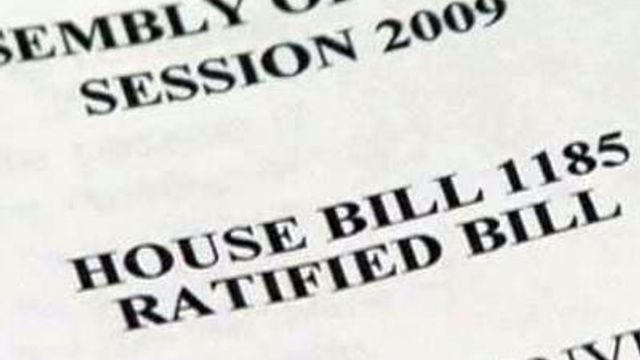Local News
Habitual DWI offenders could petition for their license under bill
A bill on the governor's desk would allow habitual drunken drivers to petition to get their driver's license back after 10 years if they meet certain conditions.
Posted — UpdatedRALEIGH, N.C. — A bill on the governor's desk would allow habitual drunken drivers to petition to get their driver's license back after 10 years if they have stayed away from drugs and alcohol and have maintained a clean criminal record.
It's unclear if Gov. Beverly Perdue will sign House Bill 1185, but if it becomes law, it would go into effect Dec. 1 and last until Dec. 1, 2014 – a change to the bill that was ratified by the state Senate.
Under North Carolina law, a habitual offender is someone who has been convicted four times of driving while impaired in less than 10 years. Once convicted, his or her license is permanently revoked.
Rep. Pricey Harrison, D-Guilford, cosponsored the piece of legislation after hearing from people in the community who were convicted of habitual DWI years ago and have since changed their lives.
"These folks have cleaned up their act, so I think that's what's driving this," Harrison said. "Particularly in rural North Carolina, it's difficult to get around without an automobile, so, this is just a chance to give them a second chance."
Marcy Henly hopes the bill does not become law.
Her mother, Kay Stokes, was killed four years ago in a wreck in which Kenneth Wayne Maready's blood alcohol level was more than three times the legal limit.
Maready had stolen a car and fled from deputies who had pulled him over before crashing into Stokes' pickup truck, killing her and injuring her then-5-year-old granddaughter.
At the time of the wreck, Maready had a revoked driver's license and six DWI convictions on his record.
Maready is now serving at least 50 years in prison.
Henley does not believe habitual offenders should be given a second chance.
"If it's like a repeat, a continuing thing, no, they don't need their driver's licenses," she said. "Laws are supposed to be there to protect people. There wasn't no law there to protect my mama from dying."
• Credits
Copyright 2024 by Capitol Broadcasting Company. All rights reserved. This material may not be published, broadcast, rewritten or redistributed.





